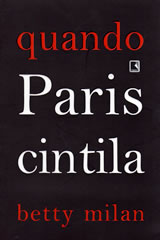
excerpt
we prefer to imagine everything
the phrase “To navigate is necessary, not to live” is the expression of this I always thought it had been written by Fernando Pessoa perhaps because it is found in the beginning of his Obra poética or because of the verse declaring “The endless sea is Portuguese” perhaps I imagined it was of his authorship for some entirely subjective reason for the intimate certainty that an idea so pertinent could only have come from my native tongue the tongue in which ideas spring forth and truly touch us
synopsis
quando Paris cintila consists of 33 crônicas without capital letters or periods – as in Paris não acaba nunca. Through them the reader is transported to Europe, Asia, North and South America, discovering that it is as fundamental to imagine as it is to break habits. The author questions the norms of Western medicine and points out the virtues of alternative medicine. She compares our way of life to that of the Chinese and the people of India. The themes of the book are many, among them the life style of the artist, the ascetic, and the writer.
history
This title was launched on March 18, 2008, at the Livraria Cultura in São Paulo during an event that included presentation of texts by the writer Fernando Nuno and by the Chinese physician Fang Liu, who spoke on longevity and patience. Afterward, three of the crônicas were read by José Celso Martinez Corrêa. The book was recommended by the magazine Veja in its issue of March 5, 2008. quando Paris cintila is an invitation to a voyage.
opinion
“There is an aesthetic, a poetry, and a philosophy demonstrated through these experiences in places so distant from one another. Since the first of the crônicas in quando Paris cintila, in which the sun shining on stained glass and the Arabesque tracery evoke the presence of the Orient and art, there is always a particular, a detail, a perception of something that alludes to the universal.”
Claudio Willer, Estado de Minas, April 12, 2008
(…) always an unusual point of view.
Veja, March 5, 2008.
areas of interest
Literature, Philosophy , Psychoanalysis, Psychology, Sociology, Anthropology.
critical reaction
where to purchase
Livraria Cultura (portuguese – printed)

excerpt
we prefer to imagine everything
the phrase “To navigate is necessary, not to live” is the expression of this I always thought it had been written by Fernando Pessoa perhaps because it is found in the beginning of his Obra poética or because of the verse declaring “The endless sea is Portuguese” perhaps I imagined it was of his authorship for some entirely subjective reason for the intimate certainty that an idea so pertinent could only have come from my native tongue the tongue in which ideas spring forth and truly touch us
synopsis
quando Paris cintila consists of 33 crônicas without capital letters or periods – as in Paris não acaba nunca. Through them the reader is transported to Europe, Asia, North and South America, discovering that it is as fundamental to imagine as it is to break habits. The author questions the norms of Western medicine and points out the virtues of alternative medicine. She compares our way of life to that of the Chinese and the people of India. The themes of the book are many, among them the life style of the artist, the ascetic, and the writer.
history
This title was launched on March 18, 2008, at the Livraria Cultura in São Paulo during an event that included presentation of texts by the writer Fernando Nuno and by the Chinese physician Fang Liu, who spoke on longevity and patience. Afterward, three of the crônicas were read by José Celso Martinez Corrêa. The book was recommended by the magazine Veja in its issue of March 5, 2008. quando Paris cintila is an invitation to a voyage.
opinion
“There is an aesthetic, a poetry, and a philosophy demonstrated through these experiences in places so distant from one another. Since the first of the crônicas in quando Paris cintila, in which the sun shining on stained glass and the Arabesque tracery evoke the presence of the Orient and art, there is always a particular, a detail, a perception of something that alludes to the universal.”
Claudio Willer, Estado de Minas, April 12, 2008
(…) always an unusual point of view.
Veja, March 5, 2008.
areas of interest
Literature, Philosophy , Psychoanalysis, Psychology, Sociology, Anthropology.


